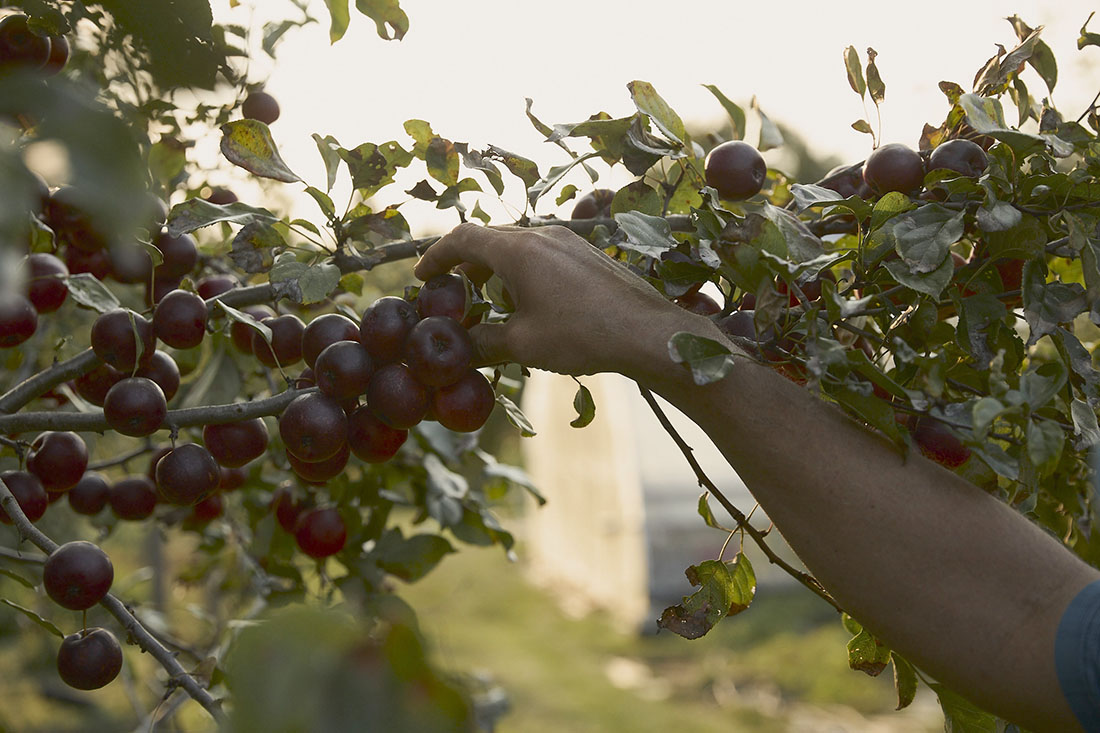Where Fruit Flourishes
On a small parcel of land that runs alongside Indian Creek, not far from Pakenham, surrounded by landscapes dotted with tiny country churches and old schoolhouses, Scott Sigurdson and Marisa Buccione have planted more than 1,000 fruit trees. There are hazelnuts, heirloom plums and pears and apples galore.
“Our plan was to be an orchard farm,” Sigurdson recalls, “but then what?”
So, just in case caring for and pruning fruit trees didn’t keep them busy enough, the couple, both of whom initially maintained careers off the farm — Buccione in long-term care and Sigurdson as a freelance graphic designer — decided to start a vegetable garden alongside the orchard. Along with greenhouses packed with tomatoes, cucumbers and seedlings for each successive planting cycle, they have interplanted the fruit trees with all the market garden staples: lettuce, kale, beans, peppers, squash, zucchini, herbs, root vegetables, currants, grapes, gooseberries and more. In their first year of production, the couple had 12 market garden CSA basket subscribers, “just to see if it was something we would continue,” Sigurdson says. Now, they have 180 and sell at the Almonte and Carp farmers’ markets.
On a separate three-acre piece of land rented nearby, they grow 35,000 heads of garlic of eight differing varieties, as well as onions and potatoes.
“It takes five teenaged boys two weeks to harvest the garlic,” Sigurdson says. It is packaged in a small hessian bags, tied with brown string and printed labels, then sent to customers across the country. For garlic that doesn’t make the grade, that which is either too small or too scrappy, they hold a “scratch and dent” sale.
Both pieces of land are farmed following a hybrid of regenerative, agroforestry and deep organic farming principles.
“We are trying to create an intact ecosystem here,” Sigurdson explains. “Our intent is to get the ecosystem working for us with minimal intervention.”
To that end, by strategically planting the fruit trees, the orchard becomes “more resilient to the onset of pest or disease due to the natural partitions that result from this layout. An apple disease or pest will have to traverse three or four trees or cross several vegetable beds before it finds another apple tree to infect,” according to Sigurdson. Distance helps slow the spread of bugs and disease and increases insect and animal diversity.
The two also choose their seeds carefully, selecting for disease resistance, especially among the many varieties of heirloom tomatoes they grow. They advocate for as little intervention as possible and any intervention that is necessary is largely of the natural living variety. For example, they’ll use a bacterium, Bacillus subtilis, commonly found in probiotics, that eats fungus. Or plant mustards as the off-gases act as a natural bio-fumigant to help with disease issues in the soil. Ladybugs and parasitic wasps help control aphids, while Btk is a spray-on bacterium naturally found in soil, used to control cabbage moth. Soil enhancers include a water-soluble fish emulsion for fertility, pelletized chicken manure and many truckloads of horse manure. “But slugs are a problem we’ve never solved,” shrugs Sigurdson with a wry smile.
They have, however, solved the problem of the rising costs of electricity. In 2021, the farm became solar-powered, in part to curb the huge costs associated with heating the greenhouses and cooling the walk-in fridge.
Both Buccione and Sigurdson have family backgrounds in farming; she in Abruzzo, Italy; he in Manitoba and Saskatchewan. Testament to this history is a wall of gardening tools, with the beautiful patina of many hands and hard work. Until recently, Buccione maintained her mother’s large garden providing vegetables for much of her family. However, neither had direct experience in a commercial operation before they founded Indian Creek Orchard Gardens. But Sigurdson now gives lectures and presentations, sharing the knowledge he has garnered “from books, from YouTube and from trial and error,” he explains.
In a typical week, they’ll harvest 500 heads of lettuce, replacing that with 24 planting successions during the season. Each week, they’ll pack a giant walk-in cooler to the rafters with greens and leeks, potatoes and beets, carrots, cucumbers and more, while crates of vibrantly coloured tomatoes await CSA customers who come to the farm to pick up their weekly share.
The couple has become firmly anchored in the Mississippi Mills community and donates hundreds of pounds of vegetables to the Lanark County Food Bank. They actively lobby all levels of government, advocating for tighter pesticide regulations and more robust environmental protections.
In 2019, they took on oversight and management of the Mississippi Mills Pollinator Pilot Project. This is an initiative that restores roadside pollinator habitat and seeks to control the spread of invasive species such as wild parsnip. The farm website explains: “Many of our neighbours and environmentally conscious community members have joined us to make this undertaking both a success as well as a fun community-building project. We have adopted a two-kilometre stretch of Sugarbush road to keep the spray trucks far away from our farm and homes.”
“There is no place we’d rather be,” they say.
Indian Creek Orchard Gardens
919 Sugarbush Rd., Pakenham, Ont.
indiancreekorchard.com | @indiancreekorchardgardens











